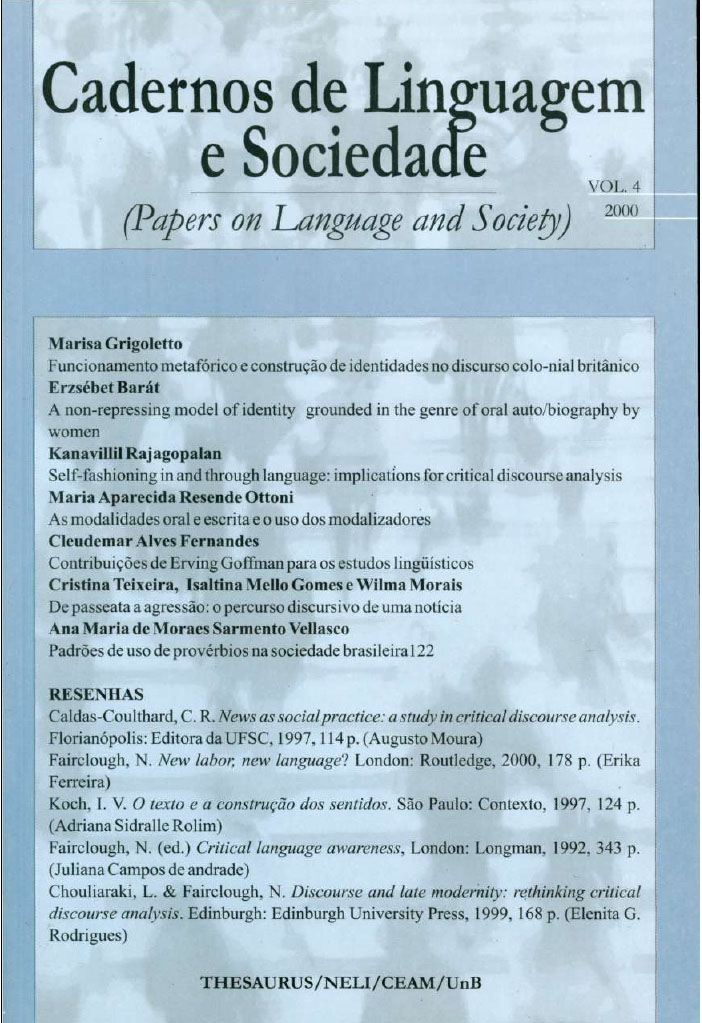A non-represing model of identity grounded in the genre of oral auto/biography by women
DOI:
https://doi.org/10.26512/les.v4i0.6463Palavras-chave:
Discourse, Identity, Gender, Auto/biography, PowerResumo
My paper is an attempt at the theorisation of identity from a materialist feminist perspective, drawing on the oral life narratives of Hungarian women. I would like to contribute to the ongoing debates on the limits and value of identity politics for feminist political and ethical objectives. In my view identity is a discursive construct that is never finished but aspires to momentary cohesion. The basic social conditions for such a Self is multiplicity and equivalent relations of power. Such a non-repressive model entails two major changes to exclusionary conceptualisations of identity. One is the recognition of the connectedness of the Self to the Other, that is the intersubjective nature of the Self. The other is difference, heterogeneity within the Self that is the condition for the former. As a discursively mediated practice of telling a life, auto/biography is understood to be the narrative site for making sense of the Self. Its major function is to construct a coherent Self out of the heterogeneous socio-cultural positionings available at any particular moment of telling. This sense of temporay coherence is achieved through the articulatory practices of the genre, that is, through the narrative device of emplotment. My data consists of eight life-span narratives shared with me by eight woman friends of mine. I analyse one of them, the life narrative by Adél, in detail for a case study. I shall focus on the analysis of the dilemma of a relational identity which all these narratives are re/constructing as their central theme. The dilemmas are all formulated from a gendered position problematising the limits of being a woman in contemporary Hungarian society. My major interest in the analysis is to see whether it is possible for Adél, to subvert, or transform even, the dominant hegemonic relations of power.
Downloads
Referências
Billig, M. et al. Ideological dilemmas: a social psychology of everyday thinking. London: Sage, 1988.
Borland, K. “That’s not what I said”: interpretive conflict in oral narrative research. In: S. b. gluck & d. Patai (eds.) Women’s words: the feminist practice of oral history. London & New York: Routledge, 1991, pp. 63-76.
Bornat, J. Is oral history an auto/biography? In L. Stanley(ed.) Auto/biography,3:(1) & 3:(2):17-30.
Butler, J. Gender trouble: feminism and the subversion of identity. London & New York: routledge, 1990.
Butler, J. Excitable speech: a politics of the performative. London & New York: Routledge, 1997.
De beauvoir, S. The second sex. Trans. H. M. Parshley. Harmondsworth: Penguin books, 1972.
Fairclough, n. Discourse and social change. Cambridge: Polity Press, 1992.Fairclough, n. Critical discourse analysis. London: Longman, 1995.
Foucault, M. The archaeology of knowledge. London: Tavistock, 1972.
Foucault, M. The foucault reader: an introduction to Foucault’s thought. P. rabinow (ed.), London: Penguin, 1991.
Frazer, N. Unruly practices: power, discourse, and gender in contemporary social theory. Cambridge: Polity Press, 1989.
Genette, G. Narrative discourse: an essay in method. Trans. J. e. Lewin. Ithaca: Cornell University Press, 1980.gluck, S. b. & Patai, d. (eds.) Women’s words: the feminist practice of oral history. London & New York: Routledge, 1991.
Hennessy, R. Materialist feminism: the politics of discourse. London & New York: Routledge, 1993.
Laclau, e. & Mouffe, S. Hegemony and socialist strategy: towards a radical democratic politics. London: Verso, 1984.Maynard, M. & Purvis, J. (eds.) researching women’s life from a feminist perspective. London: Taylor & Francis.
Mchoul, A. readings. In: C. d. baker & a. Luke (eds.) Towards a critical sociology of reading pedagogy. Amsterdam: John Benjamins Publishing Co., 1983.
Mouffe, C. The return of the political. London: Verso, 1993.
Ramazanoglu, C. (ed.) Up against Foucault: explorations of tensions between Foucault and feminism. London & New York: Routledge, 1993.
Ricoeur, P. Oneself as another. Trans. K. blamey. Chicago & London: University of Chicago Press, 1991.
Shotter, J. becoming someone: identity and belonging. In:n. Coupland & J. F. nussbaum (eds.) Discourse and lifespan identity. Vol. 3. London: Sage, pp. 5-27.
Stanley, L. The auto/biographical ‘I’: the theory and practice of feminist auto/biography. New York & Manchester: Manchester University Press, 1992.
Stanton, D. autography: is the subject different? In: D. Stanton (ed.) The female autograph. Chicago & London: Chicago University Press, 1984, pp. 3-21.
Tannen, d. how is conversation like literary discourse? The role of imagery and details in creating involvement. In: P. downing et al. (eds.) The linguistics of literacy. amsterdam/Philadelphia: John Benjamins, 1992, pp. 31-46.
Taylor, C. Sources of the self: the making of the modern identity. Cambridge, Ma: Harvard University Press, 1985.
Weir, a. Sacrificial logics: feminist theory and the critique of identity. London & New York: Routledge, 1994.
Wittig, M. The category of sex. In:M. Wittig (ed.) The straight mind and other essays. Boston: Beacon Press, 1992, pp. 1-8.
Downloads
Publicado
Como Citar
Edição
Seção
Licença
Autores/as que publicam nesta revista concordam com os seguintes termos:
Autores/as mantêm os direitos autorais e concedem à revista o direito de primeira publicação, sendo o trabalho simultaneamente licenciado sob a https://creativecommons.org/licenses/by-nc-nd/4.0/o que permite o compartilhamento do trabalho com reconhecimento da autoria do trabalho e publicação inicial nesta revista.



